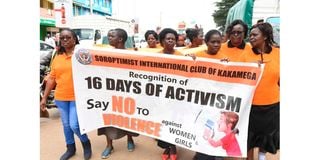Gender-based violence: It's time for men to speak up

A group of women march on the streets of Kakamega town to mark the 16 days of activism Against Gender-Based Violence in 2019. This day was ushered in by the happenings on November 25, 1960, in the Dominican Republic.
All over the world, 16 Days of Activism against Gender-Based Violence (GBV) is marked towards the end of every year.
It’s a trending topic online and offline. Even for those who usually spew violent rhetoric, for this brief period, they call out gender-based violence before they return to their default settings.
Organisations such as Urgent Action Fund-Africa who support feminist advocacy double their efforts in this campaign period to work with women’s rights organisations, gender non-conforming groups, and women human rights defenders to encourage declarations of national zero tolerance policies on GBV.
Activists raise their voices even more, calling for change and justice for survivors.
During this period, our leadership also speaks out against violence, but fails to end the systemic problems that perpetuate GBV.
Yet every time this period comes round, I worry about the efficacy of the message we are trying to push. Ideally, a campaign against violence should take root in a country that has experienced so much of it, against the backdrop of colonial, post-election and pandemic violence, just to name some of the contexts.
But gender-based violence remains pervasive.
Of course, I’m significantly biased. The gender that tends to have the most violence meted out on them is mine. The gender that people listen to the least is mine. I have long questioned why this is, and tried to interrogate the obvious answer of patriarchy.
Why is it that arguments have to be presented for people to not be violent? Why do I have to say, “I could be your sister, your mother, your daughter”, for someone to relate to me as deserving of empathy? Isn’t my existence as a human being enough?
I write about violence against women almost every month, because there is simply so much to write about along this journey of interrogation. I write about the legal and societal implications of letting men who commit violence against others go free (think, for example, of the two rugby players who were accused of rape, and then set free on bail, only to try and kill one of the witnesses in the trial).
I write about how women are inevitably linked to and blamed for what happens to them, usually because the balances of power are skewed and men are held in such high regard (think, for another example, of the Ndichu brothers case and how their ex-wives were immediately brought to the fore of a story that had nothing to do with them).
But today I think it’s time I write about how this fight should no longer be ours to fight. It’s long past due for the perpetrators of the violence, and those who have claimed to be women’s allies, to step up and take over the 16 Days of Activism, and make their voices – outside of just these days – heard.
For all those who say not all men are violent: where are the non-violent men? They seem so silent. And that silence, the inaction and perfunctory allyship, then condones violence.
I say this because it is obvious to me that the perpetrators are not listening. What we are doing as women is moving so much slower than it should be. Women need justice now.
In the thick of the pandemic, the only numbers that remained consistent, and even rose, were Covid case numbers, and the reports of abuse from people who now had to live with their abusers 24 hours a day. Each day, there were more reports of abuse – those in power did not seem to do anything to address it.
The burden fell on women’s organisations – like women in media through the Association of Media Women in Kenya, who called for action and are still keeping up the pressure.
Our campaigns thus far seem to fall on deaf ears, as the cases just get more and more shocking – the girl who was thrown from a hotel’s seventh floor for refusing to have sex with a man she had been dating for a month, remember that? Remember the comfort with which a Kenyan radio host said she basically deserved it?
Very few people are going beyond their words to dismantle oppression. For those who speak out during the 16 Days of Activism, what other steps are they taking to protect women? Have they opened their wallets?
Time for men to speak up
If the words women say are not changing the way men think, then it is time for someone else to speak – the so-called modern men who have the power to dismantle this system.
The behaviour change that I am longing to see is the one that brings a 16 Days of Activism that is led by the villains, not the survivors.
If men care so much about the victims of gender-based violence, 16 Days of Activism is an opportunity for them to publicly commit to hold other violent men accountable, in private and in public.
Men need to call themselves out for what they know they’re doing. I dare to hope that one day, these 16 Days won’t even be needed – but until then, I am exhausted, and ready to pass the baton.





